最新2019年整理过去分词_语法___高中英语必修五_unit1《Great_scientists》Grammar课件_新人教版必修
高中英语Unit1GreatscientistsSectionⅢGrammar_过去分词作定语和表语教案(含解析)新人教版必修5

Section Ⅲ Grammar—过去分词作定语和表语语法图解探究发现①But he became inspired when he thought about helping ordinary people exposed to cholera.②So many thousands of terrified people died every time there was an outbreak.③He became interested in two theories that possibly explained how cholera killed people.④From the stomach the disease quickly attacked the body and soon the affected person died.⑤He was determined to find out why.⑥He found that it came from the river polluted by the dirty water from London.⑦He immediately told the astonished people in Broad Street to remove the handle from the pump so that it could not be used.⑧With this extra evidence John Snow was able to announce with certainty that polluted water carried the germs.[我的发现](1)例句①②④⑥⑦⑧中的过去分词(短语)作定语。
(2)例句②④⑦⑧中为单个的过去分词作定语,常常放于被修饰名词的前面;例句①⑥中过去分词短语作定语,常常放于被修饰名词的后面。
高二英语《Unit1 Great Scientists-Grammar过去分词》
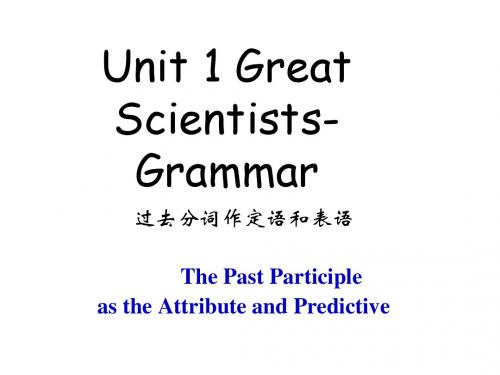
定 语 非 谓 语
谓 语
被 动 语 态
表 语 补 语
Find out all the past participles in the reading and analyse them:
exposed to terrified affected polluted polluted polluted astonished inspired interested determined linked
2、关系词在句中是否做成分 The news that l have passed the exam is true. (同位语从句,即从句所表达的意思就是前面名词的内容。 (that在从句中不充当任何成份。) The news that he told me just now is true. (定语从句,从句对前面名词起修饰限制作用,即 “他告诉我的”那个消息,而不是别的消息。) (that在从句中作told的宾语。)
过去分词短语作定语时,位于它所修饰 的名词或代词后面。
people addicted to drugs a novel written by Luxun
the advice given to the patient
an old man supported by his son
a school built for orphans
(2) 功能
过去分词或过去分词短语作定语时,其功能 相当于一个定语从句。 The stolen bike belongs to Jack. The bike which had been stolen belongs to Jack. The lecture given by Professor Zhang is about environment protection. The lecture which was given by Professor Zhang is about the environment protection.
人教版 高中英语 必修5 unit1 知识讲解 过去分词作表语和定语
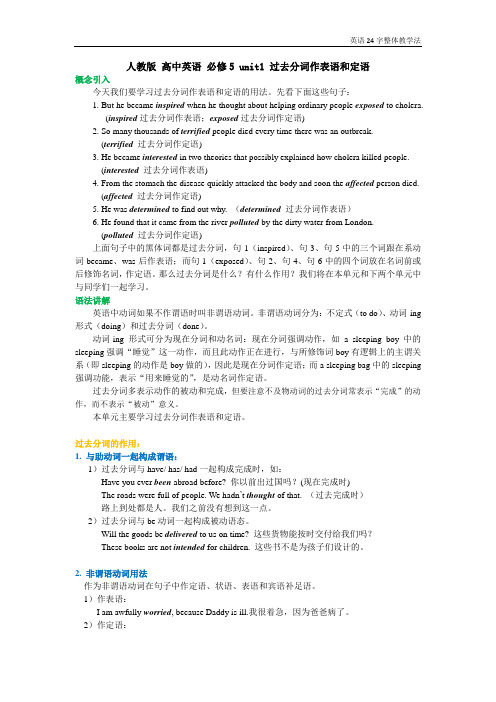
人教版高中英语必修5 unit1 过去分词作表语和定语概念引入今天我们要学习过去分词作表语和定语的用法。
先看下面这些句子:1. But he became inspired when he thought about helping ordinary people exposed to cholera.(inspired过去分词作表语;exposed过去分词作定语)2. So many thousands of terrified people died every time there was an outbreak.(terrified过去分词作定语)3. He became interested in two theories that possibly explained how cholera killed people.(interested 过去分词作表语)4. From the stomach the disease quickly attacked the body and soon the affected person died.(affected过去分词作定语)5. He was determined to find out why. (determined过去分词作表语)6. He found that it came from the river polluted by the dirty water from London.(polluted过去分词作定语)上面句子中的黑体词都是过去分词,句1(inspired)、句3、句5中的三个词跟在系动词became、was后作表语;而句1(exposed)、句2、句4、句6中的四个词放在名词前或后修饰名词,作定语。
那么过去分词是什么?有什么作用?我们将在本单元和下两个单元中与同学们一起学习。
语法讲解英语中动词如果不作谓语时叫非谓语动词。
高二英语必修五unit1知识点
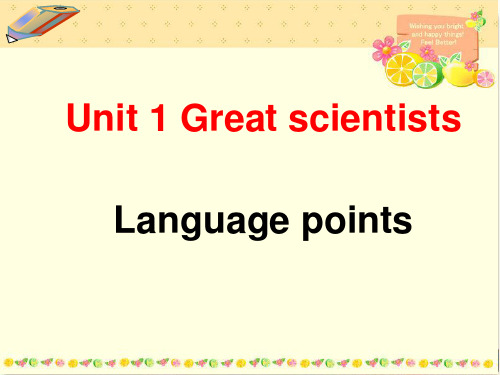
absorb one’s attention 吸引某人的注意力
be absorbed in sth.
专心于某事
be absorbed by/into 被……吞并;为……所吸收
Clever children absorb knowledge easily. He is absorbed in his business.
3、难点
过去分词作定语,表语
一、重要词汇拓展
1.science n.科学 →scientific adj.科学的→ scientist n.科学家 2. announce v.宣布 →announcement n.宣布→ announcer n.广播员,告知者 3. instruct v..指导,命令 →instruction n.指导,指示→ instructive adj.有益的,教育性的 4. enthusiastic adj.热心的,热情的 →enthusiasm n.狂热,热心→ enthusiast n.热心家,狂热者 5. valuable adj.有价值的 →value n. 价值 → value v. 估价, 评价
3. Neither its cause nor its cure was understood. ▲cure vt.&n. 治愈,治疗法;常用于cure sb. of ...结构中。
【易混辨析】
treat和cure
(1) treat强调治疗过程。 treat还可作“对待;看待;款待;请客”讲。 treat sb for sth 医治某人……病 treat...as...把……看作/视为…… treat sb to...请某人……
▲ be exposed to 暴露于……
高手过招
高中英语必修五unit1_great_scientists

Unit 1 Great scientists——伟大的科学家
4 . prevent...from doing sth. 防 止 / 阻 止 ……做某事; suggest(建议)+宾语从句 _T_o__p_r_e_v_e_n_t _th__is_f_r_o_m__h_a_p_p_e_n_i_n_g__(为防 止这种情况发生)again,John Snow suggested that the source of all the water supplie _b_e_e_x_a_m__i_n_e_d___(被检测).
栏目 导引
Unit 1 Great scientists——伟大的科学家
8.Many retired people can still __c_o_n_tr_i_b_u_t_e__(贡献) to the society with their rich experience. 9.用conclude 的适当形式填空 (1)Taking account of all these factors,we may reach the _c_o_n_c_l_u_s_io_n___ that parents are the best teachers of their children.
10.用instruct的适当形式填空 (1)You will be __i_n_st_r_u_c_t_e_d__ where to go as soon as you get off the plane. (2)Do follow the _i_n_s_tr_u_c_t_i_o_n_s_ carefully before you take medicine.
单词精研 1conclude vt.& vi.断定,推断;使结束, 终止;达成,缔结
2018-2019学年高中英语人教版必修5Unit 1 Section Ⅲ Grammar——过去分词作定语和表语
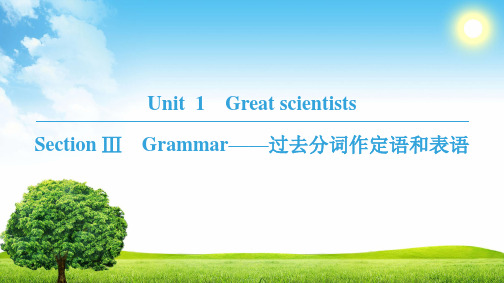
Section Ⅲ
Grammar——过去分词作定语和表语
[语 境 自 主 领 悟]
语 境 自 主 领 悟
先观察原句 1.From the stomach the disease quickly attacked the body and soon the affected person died. 2.So many thousands of terrified people died every time there was an outbreak. 3.He found that it came from the river polluted by the dirty water from London. 4.But he became inspired when he thought about helping ordinary people exposed to cholera.
返 首 页
语 境 自 主 领 悟
3.现在分词与过去分词作表语的区别 过去分词 现在分词 表示人自身的感受或事物自身的状态,常译作“感到……的” 表示事物具有的特性,常译作“令人……的”
语 法 应 用 落 实
They became so worried that they stayed awake all night.
返 首 页
语 法 精 要 点 拨
语 法 应 用 落 实
语 境 自 主 领 悟
2.过去分词作表语与被动语态的区别 过去分词作表语时,强调主语所处的状态,而动词的被动语态表示主语是动作 的承受者,强调动作。 The cup is broken.
语 法 应 用 落 实
语 法 精 要 点 拨
英语必修五unit1语法

pay sb. by the hour” 计时给某人报酬。 此题被动结构作表语。类似的有:get
burnt, get hurt , get wounded.
• What he has done is really __C__.Now his parents are _____ him.
③ She was very disappointed to hear the result.
④ He’s quite experienced in teaching beginners.
现在分词和过去分词作表语的区别
• V-ing 形式表示“令人……的” • V-ed 形式表示“某人感到……的”
2. 作定语的动词-ing形式如是一个短语,则 应放在被修饰词的后面,做后置定语,相当 于一个定语从句。
Do you know the boy playing basketball? (=who is playing basketball) 你ciple as attribute & predicative
①过去分词做定语:表被动,表完成。 ②现在分词作定语:表主动,表进行。 ③不定式作定语:表示将要发生的动作。
区别 2
Falling leaves Fallen leaves
区别 2
1. Falling leaves 2. Fallen leaves 3. Disappointing news 4. Disappointed people 5. Exciting story 6. Excited people 7. Tired people/ I’m tired 8. Tiring film
ago. 我们要去看那座建于几百年前的桥。
必修五Unit1-3语法:过去分词的用法

closed The boy sleeps with the door________. (close) closing I saw the boy _______ the door. (close)
宾语the boy, 与close主谓关系,宾补用现在分词。
宾语the door,与close构成动宾关系,用过去分词做宾补。
1. 分词做定语
closing The boy _________ the door is my brother.( close)
被修饰词the boy, 与close构成主谓关系,用现在分词。 I like the book ________ in English. (write) written 被修饰词the book, 与write构成动宾关系,用过去分词。 2. 分词做宾语补足语
4.作状语(说明事情发生的时间、 地点、条件、原因、方式、伴随动 作等情况)
1.过去分词作定语
• Most of the people invited to the party were famous scientists. • If I had the chance, I would have a cloned baby. • the fallen leaves 落下的叶子 =the leaves that have fallen. • the completed building 竣工的楼房 =the building that was completed.
Usage:
1.作定语(在名词或代词前后,一般 情况下,单个在前,短语在后)
过 去 分 词
2.作表语(在be或联系动词之后,如 become; get; go; seem; remain; keep; look; feel; sound等) 3.作宾补(主+谓+宾+宾补,补充说 明宾语的性质或所处的状态)
高中英语人教版必修5:Unit 1《Great scientists》
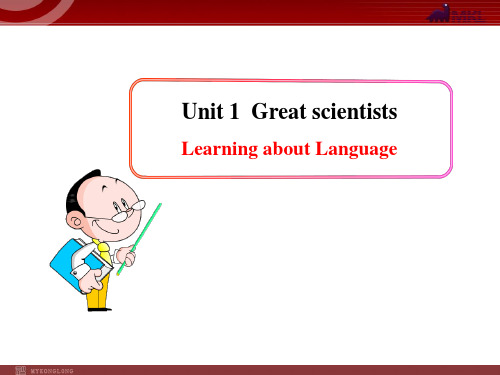
C. buying
D. being bought
3. (2012·清远高二检测)The Olympic Games, __C___in 776
B.C., did not include women players until 1912.
A. first playing
B. to be first played
华大学是成就大量杰出人物的所在地。Tsinghua University
(清华大学)和found(建立)之间是被动关系,故用过去分词作
后置定语,选C。
2. With everything she needed ___A__, the lady went home
happily.
A. bought
B. to be bought
English is difficult to learn.
6. be to blame/seek/let The house is to let. 这房子是要出租的。 The cause is not far to seek. 原因不难找到。 I felt I was to blame, too. 我觉得我也应受责备。
Struck by his sincerity,the director wanted to see him again.
4. Gentlemen always shake hands when they are introduced to each other.
Having put down my newspaper,I walked over to the window and looked out.
3. Since the director was struck by his sincerity , the director wanted to see him again.
人教新课标必修五unit1词汇及语法解析

人教新课标必修五unit1词汇及语法解析人教新标必修五unit1词汇及语法解析1 harateristi用作名词,意思是“特点;特征;特性”与feature意思相近。
它也可用作形容词意为“典型的;具有…的特点的”。
Traffi as are a harateristi f large ities 堵车是大城市的特点。
The sell is harateristi f garli 这气味是大蒜的特点。
He speas ith harateristi passin 他以特有的热情说话。
2 put frard的意思是“提出主意、计划(ffer, suggest , an idea)等”。
He ften puts frard se useful advie 他常常提出一些有用的建议。
〖帮你归纳〗put的常用词组有:put aside节省(钱、时间);储蓄;把……放在一边put aa储存(钱);放好put ba拨慢;搁置put dn放下;记下;击败;使(飞机)着陆;put ff延期;推迟put n上演;穿上;戴上put ut熄灭;关掉;扑灭put thrugh接通电话;完成put up ith忍受;忍耐put int atin/effet/pratie实施;实行3 exaine 的意思是“检查;审查;诊察;考察;测验”。
The dtr exained her arefull医生仔细地给她作了检查。
The teaher exained the students n the b the read 老师就学生读的书考学生。
exaine指的是仔细观察以了解或发现什么东西,也可用于医生检查病人,以书面或口头的形式考察学生的知识与能力。
he指的是通过检查以确保某事物正确、安全、满意或处于良好状态,核对,核实某物等。
test指的是检验和衡量某物或某人的品质、质量等,测验某人在某方面的知识或能力,还有实验、考验的意思。
He is exaining a ther 他正在查验一个理论。
必修五 unit1 Grammar--过去分词作定语、表语
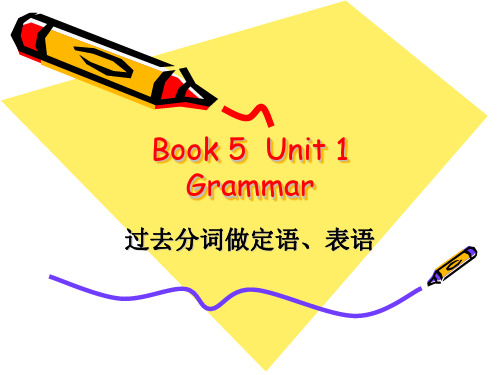
changed condition 改变了的情况 changing condition 变化着的情况
developed countries 发达国家 developing countries 发展中国家
the risen sun 升起了的太阳 the rising sun 正在升起的太阳 boiled water boiling water 开水 正沸腾的水
注意: 2)-ed形式修饰代词时,应置于代词 之后。 He is one of those invited. 3)有些过去分词作定语,前置和后 置的意义不同。 This is a used car. The method used is very efficient.
过去分词作定语
意义
不及物动词的过去分词作定语,只表示 动作已完成,不表示被动意义;及物动 词的过去分词作定语表示被动意义或已 完成的被动动作。 只表完成,不表被动(vi.) -ed作定语 表示被动(vt.) 表示被动和完成(vt.)
过去分词作表语
位于系动词后,不表示“被动”或“完成”, 而表示主语的状态或情绪,相当于形容词。
1.They are excited. 2.He looked worried after reading the letter. 3.When we heard of this, we were deeply moved.
7.a vase broken by…
6.astonished children 6.children astonished at/by… 7.a broken vase
8.a closed door 9.the tired audience 10.a trapped animal
(完整版)人教版高中英语必修五Unit1知识点详解

必修5 Unit1 Great scientistsPart 1. Warming up1.explain及物动词(vt.)解释;说明;阐明[(+to)][+wh-][+(that)]He explained that he had been cheated. 他解释说他是上当受骗了。
Can you explain how the machine operates?你能解释一下这机器是如何运转的吗?Please explain this rule to me.请给我讲解一下这条规则。
不及物动词(vi.)解释;说明;辩解I've got to explain about it. 我得解释一下此事。
2.characteristicn. 特征;特性Kindness is one of his characteristics.adj. 独特的I heard my friend’s characteristic laugh.be characteristic of sb./sth. 是.....的特性Such bluntness is characteristic of hin. 如此迟钝是他的特性。
3. Who put forward a theory about black holes?put forward 提出(建议等);提名;提前,把时钟往前拨He put forward a new plan. 他提出一个新计划。
May I put your name forward as a possible chairman of the committee?我能否提名你当委员会主席?[归纳拓展]put down 记下;镇压put out 关掉;熄灭put aside 放在一边;储存;保留put off 推迟;延期put up 建造;举起;张贴put on 穿上put away 收好选词填空(put off, put up, put forward, put aside, put out)①The plan that you _____ at the meeting is wonderful.②Many tall buildings were _____ along the road.③Firefighters have been called to _____ the fire in the city center.④He has a little money to _____ for a rainy day.⑤Don’t _____ until tomorrow what can be done today.Part 2. Pre-reading, reading and comprehending1. Do you know how to prove a new idea in scientific researchhow to prove a new idea 为“疑问词+不定式”结构,该结构可在句中作主语、宾语、表语等。
新人教英语必修五unit1词汇及语法解析

人教新课标必修五unit1词汇及语法解析1. characteristic用作名词,意思是“特点;特征;特性”与feature意思相近。
它也可用作形容词意为“典型的;具有…的特点的”。
Traffic jams are a characteristic of large cities. 堵车是大城市的特点。
The smell is characteristic of garlic. 这气味是大蒜的特点。
He speaks with characteristic passion. 他以特有的热情说话。
2. put forward的意思是“提出主意、计划(offer, suggest , an idea)等”。
He often puts forward some useful advice. 他常常提出一些有用的建议。
〖帮你归纳〗put的常用词组有:put aside节省(钱、时间);储蓄;把……放在一边put away储存(钱);放好put back拨慢;搁置put down放下;记下;击败;使(飞机)着陆;put off延期;推迟put on上演;穿上;戴上put out熄灭;关掉;扑灭put through接通电话;完成put up with忍受;忍耐put into action/effect/practice实施;实行3. examine的意思是“检查;审查;诊察;考察;测验”。
The doctor examined her carefully.医生仔细地给她作了检查。
The teacher examined the students on the book they read. 老师就学生读的书考学生。
examine指的是仔细观察以了解或发现什么东西,也可用于医生检查病人,以书面或口头的形式考察学生的知识与能力。
check指的是通过检查以确保某事物正确、安全、满意或处于良好状态,核对,核实某物等。
人教新课标必修五 Unit1 Great scientists-Grammar[教学课件]
![人教新课标必修五 Unit1 Great scientists-Grammar[教学课件]](https://img.taocdn.com/s3/m/d9d43e8bd0d233d4b14e6941.png)
Do exercises for V-ing and P.P
Book P14 exercise 5
Homework
• • • • Review the P.P that we learnt today. Do exercises on P91 (exercise 1-3) Do exercises in YH Pre-read integrating skills on P15
---What is the hen’s full-time job? ---Her full-time job is laying eggs. =Laying eggs is her full-time job.
现在分词 小结: 小结: 作表语 The play is exciting. 动名词 ≠ Exciting is My job is teaching. the play. = Teaching is my job.
begin with + n. / pron. begin by doing
the people to be interviewed the people being interviewed the people interviewed
Review some basic rules for v-ing v-
过去分词作定语, 过去分词作定语,表示分词的动作已 经完成; 经完成; 现在分词的被动语态 作定语, 作定语,表示分词的被动动作正在发 生;动词不定式的被动语态作 定语表示动词不定式的被动动作将要 发生。 发生。
What’s more?
烟草的问题是它含有一种被称为尼古丁的药。 The problem with tobacco is that it contains a drug called nicotine. 卡森夫人把她熟睡的孩子放在大树下的摇篮里。 Mrs Cousins put her sleeping baby in the basket under the tree. 你能告诉我更衣室在哪里吗? Can you tell me where the changing room is?
必修五Unit 1 Great Scientists语法点:过去分词作定语

terrified people
Past Participle as the Attribute (2)
people terrified of .....
seats reserved for water polluted by a room crowded with
过去分词短语:
I'd love to read the book written by
owned enterprises.
almost
by
accident,
has
revolutionized machine.
Complete the table with phrases that have the same meaning:
reserved seats
polluted water a crowded room
a pleased winner
astonished children
a closed door the tired audience a trapped animal
a winner pleased by
children astonished at/by ..... a door closed by .... the audience tired of ...... an animal trapped in/by......
(所使用的办法很有效率。)
The method used is very efficient.
The relation of PP and its antecedent:
A noun modified by PP can be replaced by a relative-clause:
高中英语必修五Unit1重点单词积累

高中英语必修五Unit1重点单词积累以下是小编整理的关于人教版高中英语必修五单词及语言点总结:Unit 5 Theme parks,旨在提供综合运用所需材料!词汇学习是高中学习中的一个重要环节。
提高英语语言基本技能主要依靠词汇量的提升。
同学们应该掌握好所学的英语单词!高中英语必修五单词及语言点总结Unit 1 Great ScientistsWord usage1. attend v 1)to take care; give attention2) to be present at3) to take care of ; take part in; pay attention to sth; look afterHe did not attend the meeting yesterday.The school was attended almost entirely by local childrenThere was no one to attend him but Tina.She didn't attend to what I was saying.2. expose v 1) to make visible to2) to reveal the guilt or wrong doing ofThey consider it almost a crime to expose children to violence and sex on TV.Their scheme was exposed.Don't expose the film to light.Cleaning exposed the grain of wood.3. cure v. 1)bring a person back to healthn 2) curing and being curedAntibiotics help to cure many diseases that were formerly fatal.Penicillin cured him of pneumonia.You cured me completely.There's no known cure for a cold.She tried every means to cure her child of the bad habit4. absorb v :1) to occupy the full attention, or time2) take and suck in, take in heat and light etc.Cotton gloves absorb sweat.So many good ideas! It's too much for me to absorb all at once.The old man was utterly absorbed in the book.Small businesses are absorbed by big ones.She won't be able to absorb another heavy blow.5. contribute v 1) join with others in giving help, money etc.2) have a share inHe contributed half of his savings to the relief fund.He didn't contribute one idea to the documentHe contributed generously to the Red Cross.He never contributes to the discussionThe scientist often contributes to an academic journal6. control v. to exercise authoritative or dominating influence over; directn. to hold in restraint; checkShe is skillful enough to control the machine now.The British government at that time controlled the islandYou must learn to control your temper.They have no control over him.The helicopter landed with Joe at the controls.7. determine v. to reach a decision; resolveShe determined to go that very afternoonMy mom's encouragement determined me to go on with my study He was determined to win the gameThe court determined that the man was guilty of drunken driving.They have determined where the new school will be built.8. devote v. to give or apply entirely to particular activity, cause or a personHe devoted himself to writing.He was still devoted to the study of chemistryHe has devoted his whole life to benefiting mankind.9. confuse v. 1) to cause to be unable to think clarity or act with intelligence2) to assemble without order or sense; jumbleThey confused me by their conflicting adviceYou confused Australia with Austria.His granddaughter confused the papers on his desk.10. enthusiastic adj. Having or demonstrating enthusiasmDavid is very enthusiastic about the plan.They are enthusiastic admirers of that movie star.My parents are enthusiastic skiers.11. valuable adj. 1) worth of a lot of money2) having great usefulness or valueHe bought me a valuable diamond ring as a birthday present This experience is valuable to me.12. especially adv. 1) to extend or degree deserving of special emphasis2) particularly, in particularI liked all the children, Tom especially.We need to be especially careful.The book is compiled especially for beginners.13. conclude v. 1) to bring to an end; close2) to arrive at but the process of reasonWe concluded our meeting at 9 o'clock.What can you conclude from these observations?He concluded that he would wait a little longer.The meeting concluded after two hours.14. replace v. 1) to put back into a former position or place2) to take or fill the place ofShe replaced the receiver.The brakes have to be replaced.Electric lights have replaced candles.I will replace the cup I broke.15. puzzle n. 1) something that baffles or confuses2) something, such as a toy or game, that tests one’s ingenuityv. 3) to baffle or confuse mentallyWhat puzzles me is why they didn't show up.He looked a little puzzled.His recent behavior puzzles me.Her decision was a puzzle to him.16. admire v. to regard with pleasure, wonder, and approvalWe admire her for her diplomatic tact.He admires your poems very much.He admired her new hat.17. appear vi. 1) to become visible2) to seem or look to be3) to come before the publicGradually a smile appeared on her face.It appears they are right.He appeared to be talking to himself.The famous singer is appearing this fall at the Music Festival.Useful expressions1. put forward to offer( an idea, suggestion etc.) for considerationHe put forward a very good suggestion at the meeting.You ought to put your watch forward ten minutes.2. believe in 1) to accept as true or real2) to have a firm religious faith3) to have faith or trust inChristians believe in Jesus.We believe in him.Jim believes in fresh air and morning exercises.3. in addition adv. As well asThey eat a great deal of fruit in addition.In addition, the course also produces practical experience.4. deal with: do with, concern sthHe has learnt to deal properly with all kinds of complicated situations.This book deals with an important issue.I don’t know what they do with the problem=I don’t know how they deal with the problem5. make sense 1) to make sth understand or reasonable2) to have a clear meaning3) to be a wise course of actionThis sentence doesn't make sense.Your story doesn’t make sense to meHere, read the sentence. It doesn’t seem to make sense.6. base on: to use particular information or facts as a point from which todevelop an idea, plan, etc.This play is based on a true story.We should base our theory on facts.7. apart from: without considering; except forHe lives apart from his family.Apart from a few faults, he is a trustworthy teacher.Apart from the the cost, the dress doesn’t suit me.8. look into : to investigateWe will look into this matter together.9. join in 1) to participate with in an act or activity2) to become a part or member of3) to put sth togetherWill you join me in a walk?He jion the army.Where does the path join the road?Tie a knot to join those two piece of rope.10. go over 1) go examine2) to look at or examine for a purpose3) to repeatWe went over the building.We must go over the account s carefully before we settle down. GO over the lesson again。
高中英语 unit1《Great scientists》Grammar课件 新人教版必修5

V-ed as Attribute and Predicative
V-ed 作______定语 前置 定语 单个__。 ,表示______和 完成 。
1.an honored guest 一位受到尊重的客人 a guest who is honored (by people)
V-ed 短语作______定语,通常放在被修饰 短语作 后置 定语 定语, 的名词_____,它的作用相当于一个______. 的名词 后面 ,它的作用相当于一个 定语从句
a. It came from the river polluted by the dirty water. b. It came from the river which was polluted by the dirty water.
1.You seem frightened. 2.They are excited. 3.He looked worried after reading the letter. 4.When we heard of this, we were deeply moved.
作表语的过去分词, 作表语的过去分词,在主-系-表句 系 表句 说明主语所处的一种状态 状态。 型中,说明主语所处的一种状态。其 中包括系动词在内的多种形式。 系动词在内的多种形式 中包括系动词在内的多种形式。
V-ing 修饰物,翻译为“使人感到 修饰物,翻译为“使人感到---” V-ed 修饰人,翻译为“感到” 修饰人,翻译为“感到”
区别“ 系动词+过去分词 系表结构) 过去分词( 区别“ 系动词 过去分词(系表结构)” 系动词+ 过去分词(被动语态) 和“系动词 过去分词(被动语态)” A. The library is closed. 系表结构) (系表结构) B. The library is closed at six. (被动语态) 被动语态) 被动语态 C. The library is closed by the teacher. (被动语态) 被动语态) 被动语态 系表结构表示主语的特点或所处的状态, 表示主语的特点或所处的状态 系表结构表示主语的特点或所处的状态,强 主谓关系。被动语态表示动作,强调动宾 表示动作 调主谓关系。被动语态表示动作,强调动宾 关系。标志:行为执行者由by短语来表示 短语来表示; 关系。标志:行为执行者由 短语来表示; 有具体的时间,表示当时的动作。 有具体的时间,表示当时的动作。
2019年英语新同步浙江专用必修五讲义:Unit 1 Section Ⅲ Grammar—_过去分词作定语和表语
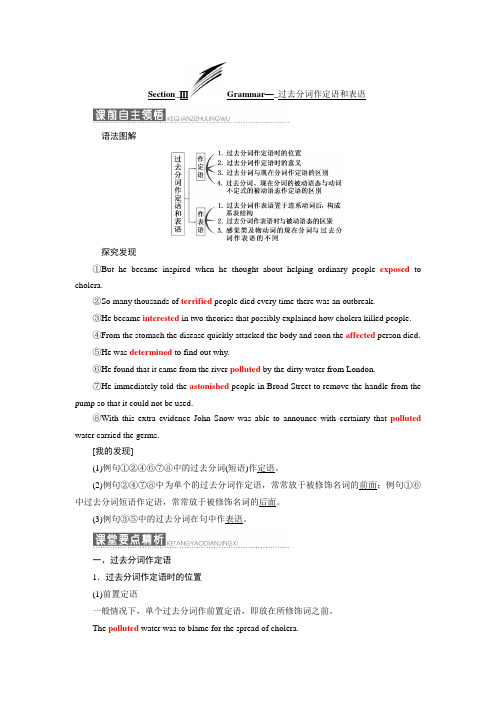
Section_ⅢGrammar—_过去分词作定语和表语语法图解探究发现①But he became inspired when he thought about helping ordinary people exposed to cholera.②So many thousands of terrified people died every time there was an outbreak.③He became interested in two theories that possibly explained how cholera killed people.④From the stomach the disease quickly attacked the body and soon the affected person died.⑤He was determined to find out why.⑥He found that it came from the river polluted by the dirty water from London.⑦He immediately told the astonished people in Broad Street to remove the handle from the pump so that it could not be used.⑧With this extra evidence John Snow was able to announce with certainty that polluted water carried the germs.[我的发现](1)例句①②④⑥⑦⑧中的过去分词(短语)作定语。
(2)例句②④⑦⑧中为单个的过去分词作定语,常常放于被修饰名词的前面;例句①⑥中过去分词短语作定语,常常放于被修饰名词的后面。
高中英语人教必修五unit1GreatScientists全单元优质教案
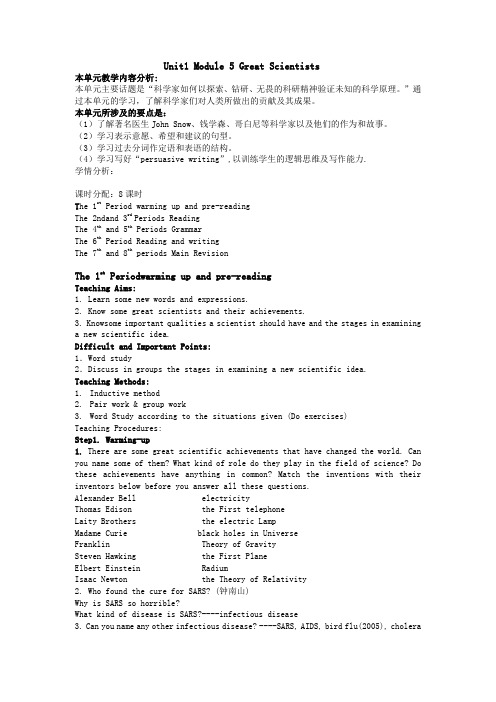
Unit1 Module 5 Great Scientists本单元教学内容分析:本单元主要话题是“科学家如何以探索、钻研、无畏的科研精神验证未知的科学原理。
”通过本单元的学习,了解科学家们对人类所做出的贡献及其成果。
本单元所涉及的要点是:(1)了解著名医生John Snow、钱学森、哥白尼等科学家以及他们的作为和故事。
(2)学习表示意愿、希望和建议的句型。
(3)学习过去分词作定语和表语的结构。
(4)学习写好“persuasive writing”,以训练学生的逻辑思维及写作能力.学情分析:课时分配:8课时T he 1st Period warming up and pre-readingThe 2ndand 3rd Periods ReadingThe 4th and 5th Periods GrammarThe 6th Period Reading and writingThe 7th and 8th periods Main RevisionThe 1st Periodwarming up and pre-readingTeaching Aims:1. Learn some new words and expressions.2. Know some great scientists and their achievements.3. Knowsome important qualities a scientist should have and the stages in examininga new scientific idea.Difficult and Important Points:1.Word study2.Discuss in groups the stages in examining a new scientific idea.Teaching Methods:1.Inductive method2.Pair work & group work3.Word Study according to the situations given (Do exercises)Teaching Procedures:Step1. Warming-up1. There are some great scientific achievements that have changed the world. Can you name some of them? What kind of role do they play in the field of science? Do these achievements have anything in common? Match the inventions with their inventors below before you answer all these questions.Alexander Bell electricityThomas Edison the First telephoneLaity Brothers the electric LampMadame Curie black holes in UniverseFranklin Theory of GravitySteven Hawking the First PlaneElbert Einstein RadiumIsaac Newton the Theory of Relativity2. Who found the cure for SARS? (钟南山)Why is SARS so horrible?What kind of disease is SARS?----infectious disease3. Can you name any other infectious disease? ----SARS, AIDS, bird flu(2005), choleraH1N1,HFMD(手足口病)Step2. Pre-reading1. Cholera may be rare nowadays except in some poor areas, but back in the 1830s-1840s, it was probably No.1 killer in the world. There were four outbreaks of cholera in the 1830s and 1840s, which killed many thousands of people in the industrial cities of England. In 1854 on August 31st “the most terrible outbreak of cholera which ever occurred in the kingdom” began. It was so violent and sudden that 127 people around Broad Street died in the first three days. And then a famous physician John Snow discovered the source of the disease and since then Cholera was finally brought under control.2. How did he solve the problem of cholera? Actually, he followed a scientific procedure to carry out his scientific research. The whole procedure is made up of 7 steps. Can you put them in a right order?Draw a conclusion Think of a method Collect results Make up a question Find a problem Analyze the results Repeat if necessaryStep 3 SummaryStep 4 Homework Assignment1.Read the passage John Snow Defeats “King Cholera”.2. Learn the new words by heart and prepare for tomorrow’s dictation.课后反思:The 2ndand 3rd Periods ReadingTeaching aims:1. Learn some new words and expressions.2. Improve the students’ reading skills.3. Know how to prove a new idea in scientific research.Difficult and Important Points:(1)Reading comprehension(2)What did John Snow do to prove a new idea in scientific research?Teaching Methods:1. Group work2. Competition3. Illustration4. Deductive MethodTeaching Procedures:Step 1Lead inBackground introduction to John SnowJohn Snow (1813-1858) was born and worked as a doctor in Great Britain. He was originally an anesthetist(麻醉师).He was so famous that he became the doctor for Queen Victoria at the births of her many children.Four outbreaks of cholera in the 1830s and 1840s killed many people in England. In 1854, “the most terrible outbreak of cholera which ever occurred in the kingdom” began. It was so violent and sudden that 127people died in the first three days. Step 2 Skimming and ScanningMore questions are given to get the general ideas of this passage and some obvious facts.Who defeats “King Cholera“? John SnowWhat happened in 1854? Cholera outbreak hit London.How many people died in 10 days? 500Why is there no death at No. 20 and 21 Broad Street as well as at No. 8 and 9 Cambridge Street?These families had not drunk the water from the Broad Street pump.Step 3 Reading for details1. Why couldn’t the cholera be under control at first?Neither its cause, not its cure was understood.2. Which theory did John Snow believe in?People absorbed cholera into their bodies with their meals.3. John Snow finally proved the theory he believed by ________.gathering information with the help of a maplooking into the source of the water for Broad Street and Cambridge Street Separating those who suffered cholera from those who didn’tBoth A and B (right choice)4. To prevent the cholera from spreading again, what did John Snow do? Suggested that the source of all water supplies be examine. Suggested that new methods of dealing with polluted water be found. Instructed the water companies not to expose people to the polluted water anymore.Step 4 Summing up: Read the passage silently and quickly and match the stages ofThe same with above:Find a problem draw a conclusion Think of a method Collect results Make up a question Analyze the results Repeat if necessaryParagraph 1: Introduction of John Snow and CholeraParagraph 2: Two theoryParagraph 3-5: Study of the breakout in 1854Paragraph 3: Think of a method: Test two theoryCollect the result: Mark the deathAnalyze the result: Reason for death and no deathParagraph 4: Analyze the result: Find the resource of the waterParagraph 5: Repeat if necessary: Find more evidence.Draw a conclusion: Cholera was spread by germPolluted water carried cholera Paragraph 6: Prevention of CholeraStep 5 Retell the passage (文章缩写仅供参考)Provide ss with a summary with some blanks. Let them retell the passage as well as pay attention to some important words.Read the passage again and fill in the blanks:John Snow was a well-known ____ in London in the ___ century. He wanted to find the ______ of cholera in order to ______ it. In 1854 when a cholera ____ out, he began to gather information. He _____ on a map where all the dead people had lived and he found that many people who had drunk the dirty water from the ______ died. Sohe decided that the polluted water carried cholera. He suggested that the _____ of all water supply be _______ and new methods of ________ with polluted water be found. Finally, “King Cholera” was defeated.Key: (见课文和教师用书)Step 6Language learning1.So many thousands of terrified people died every time there was an outbreak. 每当(疾病)突发时,总有成千的人死去【句型剖析】 1)本句是一个复合句,every time引导的是一个时间状语从句,意思是“每当……”,相当于“when”。
高考英语必修五讲义Unit1SectionⅢGrammar—_过去分词作定语和表语
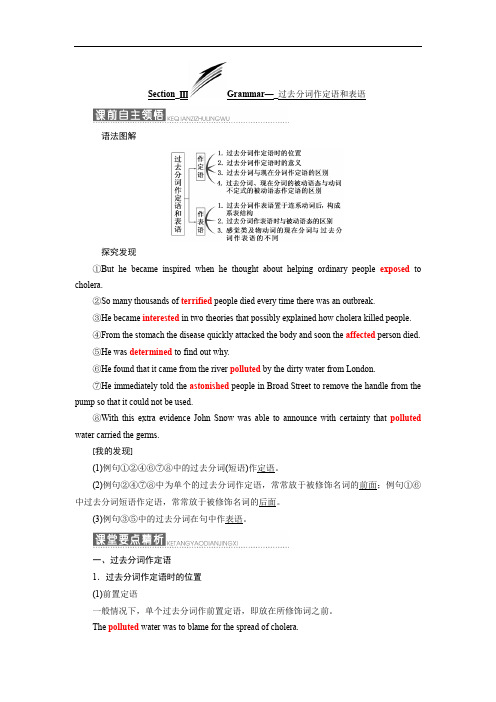
Section_ⅢGrammar—_过去分词作定语和表语语法图解探究发现①But he became inspired when he thought about helping ordinary people exposed to cholera.②So many thousands of terrified people died every time there was an outbreak.③He became interested in two theories that possibly explained how cholera killed people.④From the stomach the disease quickly attacked the body and soon the affected person died.⑤He was determined to find out why.⑥He found that it came from the river polluted by the dirty water from London.⑦He immediately told the astonished people in Broad Street to remove the handle from the pump so that it could not be used.⑧With this extra evidence John Snow was able to announce with certainty that polluted water carried the germs.[我的发现](1)例句①②④⑥⑦⑧中的过去分词(短语)作定语。
(2)例句②④⑦⑧中为单个的过去分词作定语,常常放于被修饰名词的前面;例句①⑥中过去分词短语作定语,常常放于被修饰名词的后面。
- 1、下载文档前请自行甄别文档内容的完整性,平台不提供额外的编辑、内容补充、找答案等附加服务。
- 2、"仅部分预览"的文档,不可在线预览部分如存在完整性等问题,可反馈申请退款(可完整预览的文档不适用该条件!)。
- 3、如文档侵犯您的权益,请联系客服反馈,我们会尽快为您处理(人工客服工作时间:9:00-18:30)。
but the terrible smell given off by aappoollluutteeddrriivveerr made us feel sick. We searched the forest for the polluter, and found an unknown factory throwing waste into the river. We all think it is a serious problem and one solution suggested by all of our classmates is to close the factory as soon as possible
What’s th教e d育ifference?
现在 过去 分词 分词
The water is boiling. 时间
She’s drinking boiled water.
语态
The dog is barking. The injured dog is sad.
结论:
区别
现在分词作定语,表示动作_正__在__进__行___,
V-ing 与V-ed 作表语的区别
1.They were d__e_li_g_h_t_e_dto hear the d_e__li_g_h_t_ing
news.(delight)
2. The teacher announced thee_x_c_i_t_in__g news
=The player who is loved by many people is Yao Ming.
教定育语
Example
The boy who is injured can not take part in the sports meet.
→ The injured boy can not take part in the sports meet.
Practice:仿写
The book which is written by
Han Han is popular with
students.
=The book written by Han
T
Han is popular with students.
The player loved by many people is Yao Ming.
语
The 29th Olympic Game
_h__e_ld___(hold ) in 定语
Beijing was successful.
注意过去分词做定语的位置
a closed door a polluted river • a broken window
一支点燃的蜡烛
a lighted candle
the terrible smell gwihviecnh owfafsbgyivaepnoollfuf tbeyd...river
one solution swuhgigcehsitsedsubgygaelsl toefdobuyr..c. lassmates
2. 过去分词短语作定语:通常_后__置__, 其作用相当于定语从句。
1) It’s a picture _t_h_a_t_/w__h_ic_h_ _w__a_s_ painted by Leonardo da Vinci 2) There was a woman _t_h_a_t/_w_h_o_ _w_a_s_ dressed in white a picture painted by a woman dressed in Leonardo da Vinci white
系动词的分类:
基本形式:Be( am, is, are)
“似乎类”:seem, appear, look
“感觉类”: feel, sound, smell, taste “变成类”:become, go, get, grow, fall, turn “仍然类”:remain, stay, keep
位于系动词后,不表示“被动”或“完 成”,而是表示主语的状态、特点或思 想感情等。相当于形容词
1.They are excited. 2.He looked worried after reading the
letter. 3.When we heard of this, we were
deeply moved.
___主__动__意义;
过去分词作定语,表示动作在谓语之前
已__完__成___,或具有__被__动____意义.
不及物动词的过去分词作定语,只表
示动作_已__经_完__成__,不表示被动意义;
及物动词的过去分词作定语,则表
__被__动_意__义_ 或_已__完_成__的__被_动__动__作。
二. 过去分词作表语
All books which were borrowed from the library should be returned by Friday.
→ All books borrowed from the library should be returned by Friday.
现在分词和过去分词 做定语,有何区别呢?
Grammar 过去分词V-ed的
用法
1.作定语
过 去
2.作表语
分 词
3.作补语
4.作状语
V-ed (动词的过去分词),在句中可以作定语、 表语。
The__fa_l_le_n_ (fall) 定语
leaves arຫໍສະໝຸດ beautiful.They were e_x_c_i_t_e_d__表
(excite).
一枚用过的邮票
a used stamp
一个醉鬼
a drunken/ drunk man
一、 过去分词作定语
1.前置定语 归纳1: 单个的过去分词作定语时,通常放 在被修饰的名词__之__前___。
定语
Last Monday our class went on an organized trip to a forest to study the wildlife. We planned to have our picnic lunch in the forest next to a fallen tree,
